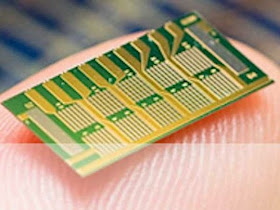Bill Gates isn't just focused on reinventing the condom. He's also into reinventing birth control for women.
Thanks to him, a new remote-controlled birth control device will soon be tested and could be available as a commercial product by 2018, reports MIT Technology Review's Gwen Kinkead. The device was created via a startup spun-out of MIT called MicroCHIPS.
It fixes an age-old problem with birth control. Women will use birth control for decades, but, when they are ready to have children, they've got to get off of birth control, in some cases getting a birth control device removed, and then re-implanted later.
MicroCHIPS is creating a device that can be filled with 16 years worth of birth control. It is implanted just under the skin. When a woman is ready to start a family, she uses a remote control to turn the device off. She can turn it on again later when she needs it.
MicroCHIPS was originally creating this device to deliver drugs for the bone-thinning condition osteoporosis. The wireless part wasn't so much about turning the device off as it was about sharing data with doctors.
But then Gates came along along and conceived of using it for birth control, too, Kinkead reports:
The idea for the device originated two years ago in a visit by Bill Gates and his colleagues to Robert Langer’s MIT lab. Gates and his colleagues asked Langer if it were feasible to create birth control that a woman could turn on and off and use for many years. Langer thought the controlled release microchip technology he invented with colleagues Michael Cima and John Santini in the 1990s and licensed to MicroCHIPS might offer a solution.
The Bill and Melinda Gates Foundation has since backed the birth control device with grants totaling over $4.6 million.
The startup MicroCHIPS also raised nearly $26 million in 2009 and 2010 from VCs, according to CrunchBase.
-businessinsider.com
Nice invention right #hehehe


No comments:
Post a Comment